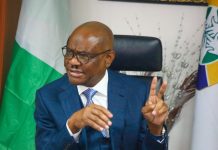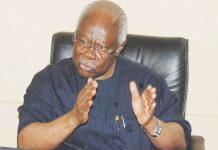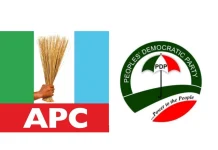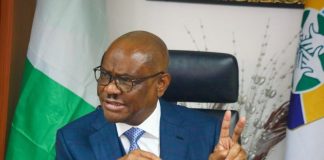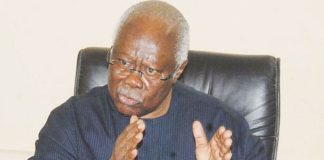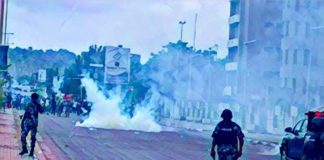🌿 Ruzu Non-Alcoholic Herbal Bitters
Ruzu Non-Alcoholic Herbal Bitters is a natural health supplement specially formulated to:
- ✅ Promote general wellness
- ✅ Detoxify the body
- ✅ Support the treatment of various ailments
Made from a powerful blend of 100% organic and medicinal herbs, Ruzu is completely alcohol-free, making it ideal for:
- 👪 All age groups
- 🌱 Health-conscious individuals
- 🌿 Anyone seeking non-alcoholic herbal remedies
Whether you're looking to boost your vitality, cleanse your system, or support healing the natural way, Ruzu Bitters offers a trusted herbal solution.
Dino Melaye testifies for Atiku in court, faults estimation of presidential election final results
Mr Melaye alleged wrongful computation of the results of the presidential election while testifying as a star witness of the PDP and Atiku at presidential election court on Friday.
A former senator, Dino Melaye, on Friday, appeared before the Presidential Election Petition Court in Abuja as a witness in the petition filed by Abubakar Atiku and the Peoples Democratic Party (PDP) to challenge the outcome of the February presidential poll.
Mr Melaye, dubbed as a star witness of the petitioners, told the court that the final result of the presidential election announced by the Independent National Electoral Commission (INEC) was wrongly computed.
The former senator, who is also the PDP candidate in the forthcoming Kogi State governorship election, is the 23rd witness the petitioners have called so far to challenge the victory of President Bola Tinubu in the disputed election.
Led in evidence by the petitioners’ lead counsel, Chris Uche, a Senior Advocate of Nigeria (SAN), Mr Melaye, who told the court that he was PDP’s National Collation Agent, identified himself as a businessman and a politician.
The witness said he refused to sign the final result announced by INEC chairman, Yakubu Mahmood, because of the wrongly computation of the figures.
“The results were wrongly computed and announced. That was why I refused to sign. I don’t endorse fraud,” Mr Melaye re-echoed his grouse that he had expressed during the collation of the results in February.
Under cross-examination by INEC’s lawyer, Mr Abubakar Mahmoud, a SAN, Mr Melaye said most PDP agents across the country did not sign the Form EC8As which were the result from the polling units.
“It is not true that all the agents signed results of the election across the federation. Not all of them signed. I may not give you the actual number of our agents that did not sign the results in protest,” he told the court.
Giving another reason for rejecting the outcome of the poll, the witness said that the results brought to the national collation centre by state electoral officers were at variance with the results recorded in the state.
Mr Melaye added that the results declared by INEC were also at variance with the ones computed from copies of the result sheets uploaded on IReV, an online portal designed to receive polling units result sheets real-time.
“My lords, exhibits have shown that result on the IReV was at variance with what was announced.
“What was brought to Abuja by State Returning Officers was totally different from what transpired in the states,” he added,” Mr Melaye said.
The witness also said he became aware of a third-party device deployed to manipulate votes in Mr Tinubu’s favour through an INEC press statement prior to the election.
Under cross-examination by INEC’s lawyer, Abubakar Mahmoud, Mr Melaye said he voted at his polling unit in Kogi State, but returned to Abuja thereafter.
He added that he walked out of the national collation centre before the end of the process as the national collation agent of the petitioners when he discovered the fraudulent activities going on at the centre.
Three grouses
Mr Melaye said that he had three major grouses with the conduct of the election one of which was the refusal of INEC to transmit the election results electronically to its portal.
He said the Electoral Act 2022 mandates INEC to electronically transmit election results from polling stations to INEC’s IReV portal.
The electoral commission’s inability to electronically transmit the presidential election results in real-time from the polling units across Nigeria forms one of the grounds upon which Atiku and other petitiners are challenging Mr Tinubu’s victory.
Under cross examination by President Tinubu’s counsel, Akin Olujinmi, also a SAN, Mr Melaye said that the failure of INEC to transmit results from Form EC8As to its IReV was an infringement of the law.
He, however, said that the result captured in Form EC8A could not be changed even where it was not transmitted electronically.
The witness further told the court that as a contributor to the drafting of the Electoral Act, the conduct of the presidential election was not done according to the law.
He said electronic transmission of results from the polling units unto the IReV was a very important aspect of the election process, adding that without that, the election circle could not be said to have been completed.
“Result is transmitted from polling units before you move to the ward collation center,” the PDP stalwart said.
He said his depositions in his statements were based on his personal experience at the national collation centre and information from the party agents across the country who reported to him as the national collation agent of the party.
He also said that some of the reports given by the agents were live feeds of what was happening at their locations real time through the use of technology.
When asked to give the actual scores of Atiku in the election since he claimed the scores were wrongly computed, the witness said that he did not calculate them directly but that they were calculated through his statistician.
The five-member panel led by Haruna Tsammani then discharged Mr Melaye from the witness box after all the respondents had questioned him.
Exhibits tendered
The petitioners also tendered two sets of documents acquired from INEV via a subpoena issued on May 26 at Friday’s proceeding.
The documents are the certified true copies of Forms EC8A series from 13 local government areas of Nasarawa.
The second set of documents are Forms EC40G and Form EC40G(2), which were summaries of polling units where elections were cancelled or disrupted.
All the respondents objected to the admissibility of the documents saying they would advance reasons for their objection at the final address stage.
Read Also:Eze Chika Nwokedi Honors NAFRC Combined Passing Out Ceremony of Disengaging Trainees Course 1/2023, Senior/Mid-Level Officers Entrepreneurship & Management Course 6/2023
The documents were, however, admitted in evidence.
The court subsequently adjourned proceedings until 19 June.
Labour Party’s Peter Obi and the Allied Peoples Movement (APM) also filed separate petitions to challenge the victory of President Tinubu.



